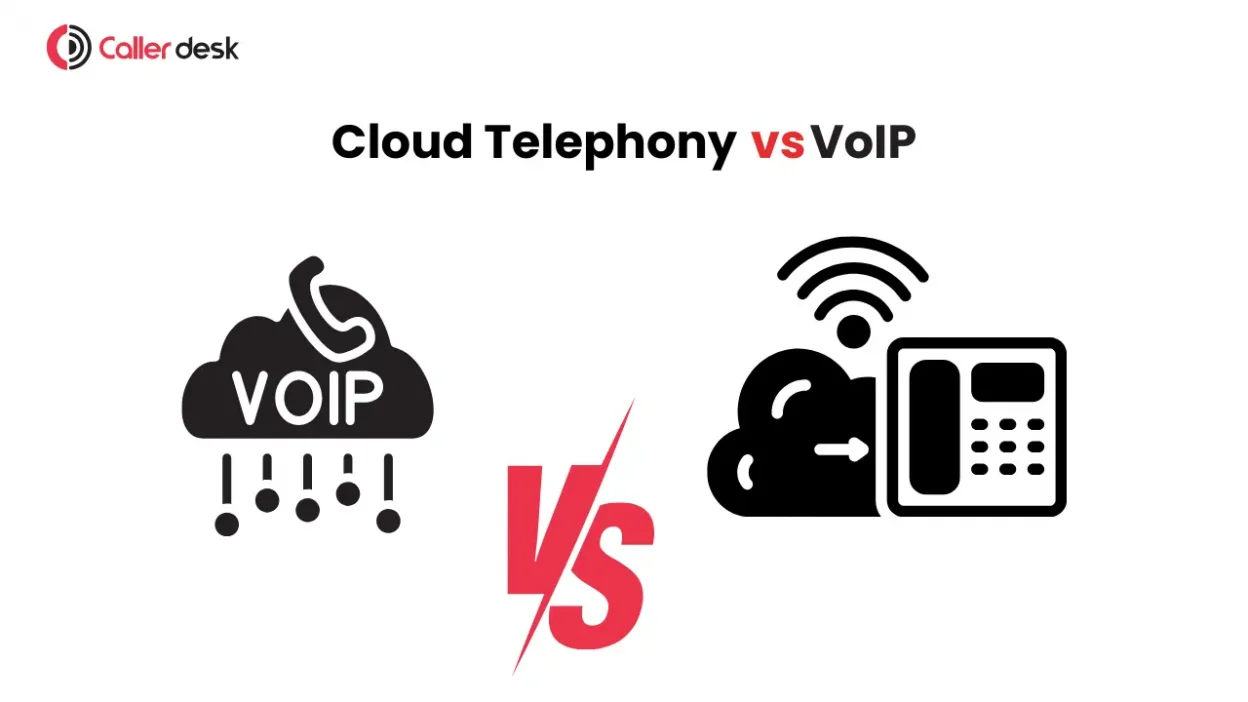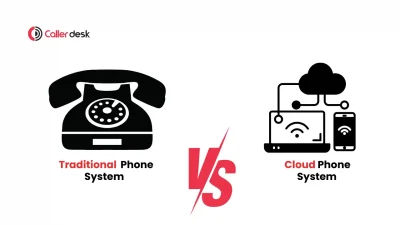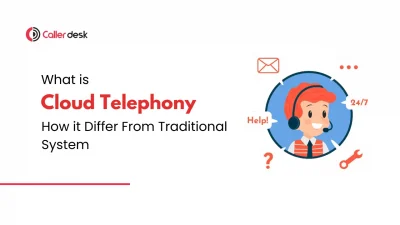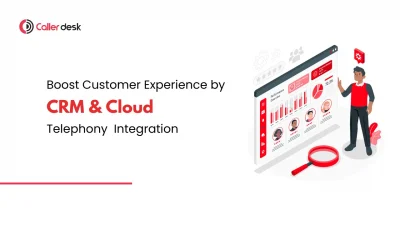Are you struggling to choose between Cloud Telephony and VoIP for your business communication needs?
Choosing the right communication system is critical for any business. Cloud Telephony offers powerful, scalable features to streamline your operations, while VoIP focuses on cost-effective internet-based calling. Both are great tools, but knowing how they differ can help you make the right choice for your business.
In this blog, we’ll break down the differences, benefits, and drawbacks of Cloud Telephony and VoIP. By the end, you’ll know exactly which one works best for your business needs and goals.
Understanding Cloud Telephony
Cloud telephony is a modern communication solution that uses the internet for business calls, enabling seamless integration across devices. It lets businesses make and receive calls from anywhere, ensuring flexibility and efficiency.
Operating like a virtual phone system, it uses technologies like SIP trunking to send voice calls online, offering VoIP-like features. Think of it as an online private phone network (hosted PBX) that’s easy to manage and scale.
One key advantage is scalability. As your business grows, you can add phone lines and features instantly without extra hardware. It also integrates with tools like CRM systems, making it a perfect fit for businesses of all sizes.
Example: If you run an online store and customer inquiries surge during peak seasons, Cloud Telephony allows you to add more lines on demand. It also integrates with your CRM, helping you track and manage customer interactions effortlessly.
Exploring VoIP (Voice over Internet Protocol)
VoIP, or Voice over Internet Protocol, is a technology that lets you make phone calls using the internet instead of traditional phone lines. VoIP works by turning your speech into digital signals that are transmitted over the internet, increasing communication efficiency and lowering expenses.
VoIP cuts down on phone expenses, especially for long-distance and international calls, and involves lower setup and maintenance costs compared to traditional phone systems.
VoIP provides virtual numbers for a local presence without physical offices, call forwarding to never miss a call, and voicemail to email for easy access to messages. It offers a cost-effective, flexible, and feature-rich communication solution, making it ideal for businesses looking to optimize their systems.
Comparing Cloud Telephony and VoIP
1. Cost Efficiency
Initial Setup and Operational Costs: Cloud Telephony often has lower initial costs than VoIP as it requires no additional hardware—just an internet connection. VoIP systems may need compatible handsets and sometimes additional hardware, which can increase upfront expenses.
Cost-Saving Potential: Both systems reduce monthly costs compared to traditional phones, especially for long-distance calls. Cloud Telephony potentially offers more savings by including additional features like auto-attendant and integration with other cloud services at no extra cost.
2. Flexibility and Scalability
Ease of Scaling: Cloud Telephony allows businesses to easily add lines or features with minimal effort, making it superior in scalability. VoIP also supports scaling but might require more resources, like increased bandwidth.
Remote Work and Global Expansion: Both technologies support remote work by allowing employees to connect from anywhere with internet access. This is crucial for businesses aiming for global expansion or maintaining a remote workforce.
Example: A marketing agency with remote teams across different time zones can use Cloud Telephony or VoIP to stay connected. Employees may make and receive calls from any location, providing effective communication and cooperation.
Pros and Cons of Cloud Telephony
Advantages:
Work from Anywhere: Cloud Telephony lets your team work from anywhere, boosting productivity and flexibility. Whether at home or on the go, employees can stay connected and collaborate easily.
Always Stay Connected: With Cloud Telephony, your communication systems remain operational during disasters or outages. This ensures your business can continue without interruption, safeguarding against unexpected downtimes.
Challenges:
Depends on Internet Connectivity: Cloud Telephony depends on a strong internet connection. Without it, call quality can drop. Ensuring a reliable internet service is crucial to make the most of Cloud Telephony.
Security and Data Privacy Concerns: Storing communication data in the cloud can raise security and privacy issues. It’s essential to choose trustworthy providers and implement strong security measures to protect sensitive information.
Pros and Cons of VoIP
Advantages:
Cost Savings on Long-Distance Calls: VoIP can save you a lot of money on long-distance and international calls. Unlike traditional phone systems, which charge heavy rates, VoIP uses the internet to make calls cheaper. This is great for businesses looking to cut down on communication costs.
Rich in Communication Features: VoIP includes functionalities like call forwarding, voicemail-to-email, video conferencing, and auto-attendant services.
Challenges:
Service Quality During Network Congestion: One of the main challenges of VoIP is call quality that suffers during network congestion. Issues like delays, echoes, or dropped calls can happen if the internet connection is slow. Having a strong and reliable internet connection can help reduce these problems.
Dependency on Internet: VoIP services depend on having a good internet connection. In places where the internet is slow or unstable, VoIP can be unreliable. Businesses should ensure their internet is strong enough to support VoIP.
Key Differences Between Cloud Telephony and VoIP
1. Hosting Arrangements and Management Responsibilities
Cloud Telephony: Third-party providers host and operate the phone system, reducing the need for physical infrastructure and business maintenance.
VoIP: Can be hosted in-house or by a third party. Managing on-premises solutions requires significant internal IT management and infrastructure.
Example: A small law firm might prefer Cloud Telephony to avoid the hassle of maintaining hardware, while a large corporation with a robust IT department might opt for VoIP to have more control over their system.
2. Impact on IT Infrastructure and Network Requirements
Cloud Telephony: Minimal IT infrastructure required, relying mainly on internet connectivity. The provider maintains hardware and software.
VoIP: Requires robust IT infrastructure, including servers and dedicated network resources, especially for on-premises setups.
Example: A remote marketing agency may adopt Cloud Telephony for its simplicity and minimal setup, while a multinational bank might implement VoIP for its high network capacity and security needs.
3. Appropriate Scenarios for Adopting Each Technology
Cloud Telephony: Best for businesses seeking a scalable, low-maintenance solution. Ideal for remote or distributed teams, with minimal hardware investment.
VoIP: Suitable for organizations with existing IT infrastructure and a need for customized solutions, offering greater control and potential cost savings.
Example: A tech startup may choose Cloud Telephony for quick deployment and scalability, while a large hospital may prefer VoIP to ensure robust internal communication and data control.
4. Considerations Based on Organizational Size and Industry Sector
Small to Medium-Sized Businesses: Cloud Telephony offers flexibility and ease of deployment, perfect for tech startups and fast-paced industries.
Larger Enterprises: VoIP is preferable for businesses needing more control and customization, especially in sectors like finance or healthcare with specific compliance requirements.
Example: A boutique design firm may opt for Cloud Telephony to stay agile, while a financial institution might rely on VoIP to meet stringent data security and regulatory standards.
Conclusion
Switching to Cloud Telephony and VoIP offers clear advantages for businesses, including lower costs, increased flexibility, and the ability to scale quickly. These modern systems are much cheaper to set up and maintain compared to traditional phone systems.
When choosing the right telephony solution, consider your business needs like the ability to support remote work and global communication. Cloud Telephony and VoIP are perfect for businesses aiming to upgrade their communication systems efficiently.
To explore these further and receive personalized advice, I recommend visiting Caller Desk.





